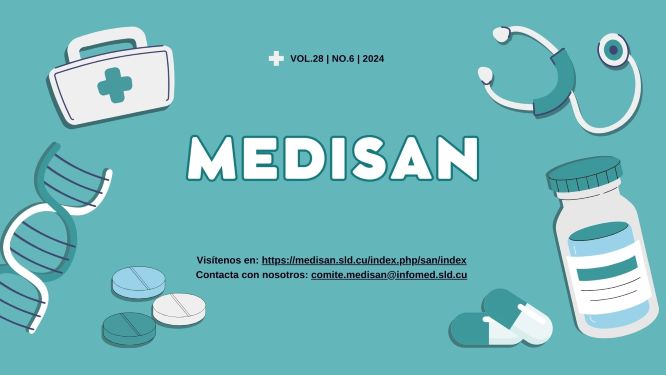Homeopathy for patients with psychosomatic disorders generated when faced with COVID 19 pandemic
Keywords:
homeopathy, psychosomatic disorders, COVID 19 pandemic.Abstract
Introduction: People can develop psychosomatic diseases facing up an epidemic factor.
Objective: To evaluate the effectiveness of the homeopathic prescription in patients with psychosomatic disorders generated when facing the COVID 19 pandemic.
Method: A quasi-experiment study of therapeutic intervention type was carried out with a unique group of 57 patients older than 19 years, assisted in the Homeopathy Service of Dr. Juan Bruno Zayas Alfonso General Hospital, from 2020 to 2022. Social-demographic, clinical-epidemiological and of response to the treatment variables were analyzed with clinical valuation in the third and eighth weeks. The absolute and relative frequency, mean and standard deviation were considered as summary measures, with a confidence level of 95 %.
Results: There was a prevalence of the 40 to 59 age group in both sexes. Approximately 61.4 % of the patients had history of one or more chronic diseases, 54.4 % was scared during the pandemic and 29.8 % suffered the death of an acquaintance or relative, mainly starting from the 60 years. There was prevalence of anxiety, excessive concern for their health, fear to die, insomnia, migraine and palpitations. The meticulousness, hypochondriac anxiety, religiosity and compulsive obsessive acts were exacerbated. The main medications used were: Arsenicumalbum, Aconitumnapellus and Natriummuriaticum to the 200 CH.
Conclusions: The homeopathic treatment conditioned a satisfactory clinical course in most of the patients, with an effectiveness of 96.5 %.
Downloads
References
2. Comisión Económica para América Latina y el Caribe (CEPAL). Los impactos sociodemográficos de la pandemia de COVID-19 en América Latina y el Caribe. Naciones Unidas, Santiago: CEPAL, 2022 [citado 24/09/2023]. Disponible en: https://repositorio.cepal.org/server/api/core/bitstreams/ee93d909-bcfa-4799-b04b-ff322e8b2ea7/content
3. Danet Danet A. Impacto psicológico de la COVID-19 en profesionales sanitarios de primera línea en el ámbito occidental. Med Clin (Barc). [Internet] 2021 May [citado 09/02/2023]; 156(9): 449–58. Disponible en: https://www.ncbi.nlm.nih.gov/pmc/articles/PMC7775650/
4. Cabedo E, Prieto J, Quiles L, Arnáez S, Rivas MR, Riveiro Y, et all. Factores asociados al impacto emocional de la pandemia por COVID-19 en profesionales sanitarios. Behavioral Psychology / Psicología Conductual. 2022 [citado 24/09/2023]; 30(1): 69-91 Disponible en: https://www.behavioralpsycho.com/wp-content/uploads/2022/04/04.Cabedo_30-1Es-1.pdf
5. Hernández Rodríguez J. Impacto de la COVID-19 sobre la salud mental de las personas. Medicentro Electrónica. 2020 Sep [citado 20/09/2023]; 24( 3 ): 578-94. Disponible en: http://scielo.sld.cu/scielo.php?script=sci_arttext&pid=S1029-30432020000300578&lng=es.
6. Durán García FA. Epidemiología de la Covid-19 La Habana. 2020. INFODIR. [citado 29/09/2023]. Disponible en: https://revinfodir.sld.cu/index.php/infodir/article/view/1382
7. Equipo del Sistema de Gestión de Incidentes (IMST) / Oficina de Equidad, Género y Diversidad Cultural (EGC). Diferencias por razones de sexo en relación con la pandemia de COVID-19 en la región de las Américas de enero del 2020 a enero del 2021. OPS. 2021 [citado 24/09/2023]. Disponible en: http://bvs.minsa.gob.pe/local/MINSA/5351.pdf
8. Wong Chew RM, Morales Fernández JA. Generalidades, aspectos clínicos y de prevención sobre COVID-19: México y Latinoamérica. Univ. Med. 2021 Sep [citado 02/10/2023]; 62(3): 97-114. Disponible en: http://bvs.minsa.gob.pe/local/MINSA/5351.pdf
9. Remond Noa R, Pérez Rodríguez NM. La Habana: atlas de la COVID-19. La Habana: Editorial UH. 2020. [citado 24/09/2023] [aprox. 216 p.] Disponible en: https://www.age-geografia.es/site/wp-content/uploads/2021/10/La-Habana-Atlas-de-la-COVID-19_compressed.pdf
10. Díaz Castrillón FJ, Toro Montoya AI. SARS-CoV-2/COVID-19: el virus, la enfermedad y la pandemia. Artículo de revisión. 2023 [citado 24/09/2023]; 24(3):183-209 Disponible en: https://docs.bvsalud.org/biblioref/2020/05/1096519/covid-19.pdf
11. Lenti Canepa M y Quezada Zevallos J. Percepción emocional ante el COVID-19 y el aislamiento social obligatorio. Av. psicol.. 18 de junio de 2022 [citado 24/09/2023];30(1):e2519. Disponible en: https://revistas.unife.edu.pe/index.php/avancesenpsicologia/article/view/2519
12. Pérez Perea L. Ampliación y reorganización de los servicios de salud y recursos humanos durante la pandemia. Cuba frente a la COVID-19. Boletín de la OPS/OMS en Cuba. Andar la salud. 2020 [citado 24/09/2023];24(2):17-9 Disponible en: https://iris.paho.org/bitstream/handle/10665.2/52514/v24n2.pdf.pdf
13. Broche Pérez Y, Fernández Castillo E y Reyes Luzardo DA. Consecuencias psicológicas de la cuarentena y el aislamiento social durante la pandemia de COVID-19. Revista Cubana de Salud Pública. 2020 [citado 24/09/2023];46(1):e2488. Disponible en: https://www.scielosp.org/article/rcsp/2020.v46suppl1/e2488/es/#
14. Pappa S, Ntella V, Giannakas T, Giannakoulis VG, Papoutsi E, Katsaounou P. Prevalence of depression, anxiety, and insomnia among healthcare workers during the COVID-19 pandemic: A systematic review and meta-analysis. Brain Behav Immun. 2020 Aug. [citado 24/09/2023];88:901-907. Disponible en: https://www.ncbi.nlm.nih.gov/pmc/articles/PMC7206431/
15. Huang Y, Zhao N. Generalized anxiety disorder, depressive symptoms and sleep quality during COVID-19 outbreak in China: a web-based cross-sectional survey. Psychiatry Res. 2020 Jun [citado 24/09/2023];288:112954. Disponible en: https://www.ncbi.nlm.nih.gov/pmc/articles/PMC7152913/
16. Huarcaya Victoria J. Consideraciones sobre la salud mental en la pandemia de COVID-19. Rev. perú. med. exp. salud pública. 2020 Abr [citado 24/10/2023]; 37(2): 327-334. Disponible en: http://www.scielo.org.pe/scielo.php?script=sci_arttext&pid=S1726-46342020000200327&lng=es.
17. Bustinzuriaga Marto I, Díaz Pita G, Santaya Labrador JM. Homeoprofilaxis en tiempos de coronavirus. Rev Ciencias Médicas (Pinar del Río) 2021 Feb [citado 11/07/2023];25(1):e4608. Disponible en: https://revcmpinar.sld.cu/index.php/publicaciones/article/view/4608
18. Kumar Savera K, Dastagiri P and Muraleedharan KC. Emerging evidence of homoeopathy in treating COVID-19 pandemic: An overview. Int J Hom Sci. 2020 [citado 24/10/2023]; 4(3):160-6. Disponible en: https://www.researchgate.net/publication/350546435_Emerging_evidence_of_homoeopathy_in_treating_COVID-19_pandemic_An_overview
19. Nayak D, Devarajan K, Pal PP, Ponnam HB, Jain N, Shastri V, et all. Efficacy of Arsenicum album 30C in the Prevention of COVID-19 in Individuals Residing in Containment Areas: A Prospective, Multicenter, Cluster-Randomized, Parallel-Arm, Community-Based, Open-Label Study. Complement Med Res. 2023 [citado 24/10/2023]; 30(5):375–85. Disponible en: https://karger.com/cmr/article-abstract/30/5/375/836949/Efficacy-of-Arsenicum-album-30C-in-the-Prevention?redirectedFrom=fulltext
20. Islam MM, Chowdhury AK, Ismail MR, Nargis A, Efficacy of Homeopathic Medicines to treat Covid-19 diseases. Indian J Intgr Med. 2022 Jul-Sep.[citado 24/09/2023];2(5): 58-63. Disponible en: https://mansapublishers.com/index.php/ijim/article/view/3430/3153
Downloads
Published
How to Cite
Issue
Section
License
All the articles can be downloaded or read for free. The journal does not charge any amount of money to the authors for the reception, edition or the publication of the articles, making the whole process completely free. Medisan has no embargo period and it is published under the license of Creative Commons, International Non Commercial Recognition 4.0, which authorizes the copy, reproduction and the total or partial distribution of the articles in any format or platform, with the conditions of citing the source of information and not to be used for profitable purposes.





